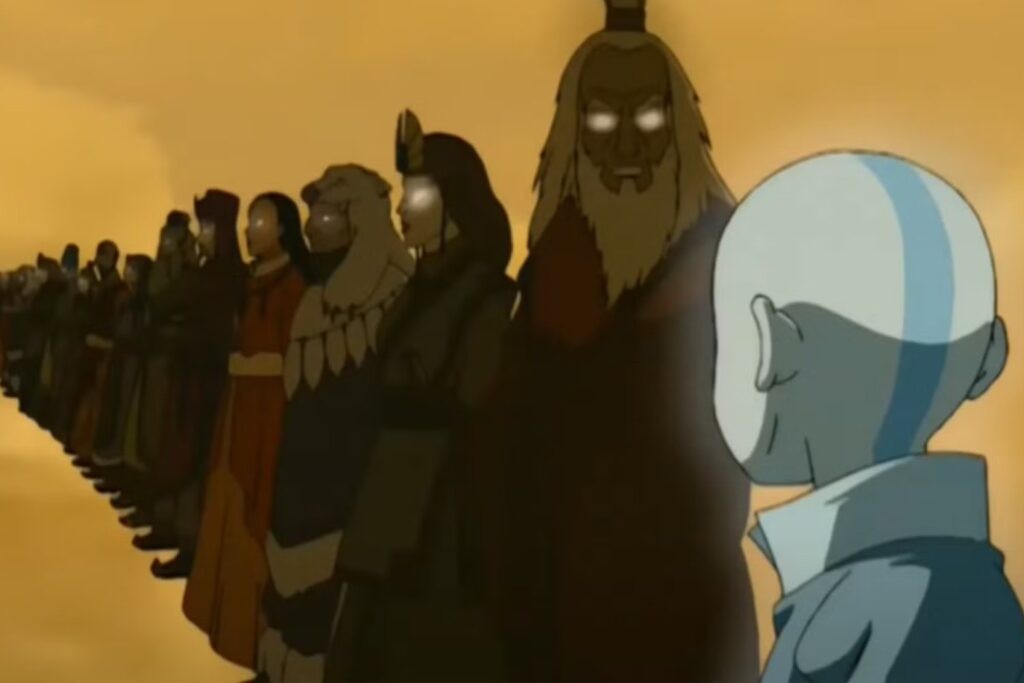The Avatar franchise’s titular hero is defined by more than just their ability to wield the abilities of all four elements; beyond their martial and spiritual prowess is a transcendental link to previous inheritors of the mantle stretching across thousands of years of history. But as we prepare for the news of a new Avatar show—and with it, the next incarnation of the Avatar—we’ve learned that they’re going to be facing a very different world and reputation, as well as a ramification that has changed the cycle of their ancestors forever.
The First Avatar
While it’s never been explicitly acknowledged just how many Avatars there have been—the young female protagonist of Seven Havens will be just the 10th we know of by name, but the implication is that there have been over a hundred—we do know that the first, Wan, ascended to the Avatar state roughly 10,000 years before the events of The Last Airbender.
Wan did so at the climax of an untold conflict between two spiritual forces: Vaatu, an entity of darkness, and Raava, a symbiotically and spiritually connected entity of light. Ten thousand years prior, during a rare planetary alignment known as a Harmonic Convergence—a cyclical event where the world is enveloped in spiritual energy, and Vaatu and Raava traditionally battled over the fate of the world for the next 10,000 years—Raava had managed to successfully seal Vaatu within the spirit realm, creating balance in the world. But Wan, deceived by Vaatu’s own machinations, managed to inadvertently sever the connection between Vaatu and Raava, unleashing chaos upon the world.
Hoping to make up for his grievous mistake, Wan journeyed with the spirit of Raava as he took on the task of learning to manipulate the four primary elements in the bending arts, so that he could fight alongside Raava in the next Harmonic Convergence. When the time came to fight Vaatu once more, Wan and Raava’s spirits merged, leading to the creation of the Avatar state, and Wan’s ability to wield all four elements at once. Victorious over Raava and once again sealing the dark spirit in the spirit realm, Wan resolved to return spirits from the physical world to their own and close the portals between them, so only he could act as the bridge between planes of existence.

How the Cycle Works…
Although the Avatar’s connection to Raava could grant an extended lifespan, they were still mortal beings. When Wan’s life was at an end, Raava ensured him that the tasks he’d set out to achieve as the balance between the physical and spirit worlds would be inherited across generations of future bearers of the mantle, beginning a cycle of spiritual reincarnation over the next 10,000 years known as the Avatar Cycle. Simply put: when one Avatar died, they would reincarnate, being born in another physical body that carried a connection to their past lives as well as Wan’s mastery of the four bending elements.
Raava and Wan’s own journey together prior to their battle with Vaatu dictated a key part of the cycle. In order for the Avatar to represent a need for harmony not just between the physical and spirt worlds, but also among the four primary kingdoms of the world that had risen up around the bending arts, the Avatar would reincarnate in a cycle that went through descendants from each of the nations. The order of reincarnation was based on the order in which Wan mastered the elements: Fire, then Air, then Water, then Earth.
Although the Avatar would be born with their connection to Raava and the generations of Avatars that came before them—as well as their inherent ability to wield multiple elements—they would not be fully realized until they gained control over the Avatar state, something that would only come with their mastery of all four elemental bending arts. Traditionally, the Avatar would journey between the four nations in the same order Wan had before them to learn the ways of each respective bending art, acting as part pan-national diplomat, and part spiritual leader.
… And How It Was Broken
The Avatar Cycle continued uninterrupted for another 10,000 years, each new inheritor of the mantle adding into a spiritual legacy that would connect them to their ancestors and descendants for the rest of time… seemingly. That all changed during the cycle of Avatar Korra—when she discovered, just weeks before the next Harmonic Convergence (and the first since Wan and Raava had sealed Vaatu away), that her uncle Unalaq had secretly been working to free Vaatu and create a new world.
Unalaq fused his spirit with that of Vaatu’s, creating the first mirror to the Avatar simply known as the Dark Avatar. In battle with Korra at the height of Harmonic Convergence, Vaatu managed to tear Raava out from Korra, destroying the now-weakened spirit entirely and completely severing Korra from her ancestors. Although Korra, with the help of her allies, managed to successfully rebirth Raava—who could never truly be eradicated, as light and darkness cannot exist without one another—and re-fuse before the Harmonic Convergence came to an end, Korra still lacked the ability to connect to the spirits of the Avatars that had come before her. The cycle as it had been known for 10,000 years had ended, and a second cycle had begun with Korra as its progenitor.

What a New Cycle Means for Avatar: Seven Havens
The immediate threat Vaatu represented quelled with the dissipation of the Dark Avatar, leaving the next period between Harmonic Convergences for the spirit to rebuild in strength. But Korra’s restored connection to Raava as the beginning of a new Avatar Cycle led to her also choosing to re-open the spirit portals sealed by Wan thousands of years prior. Korra declared that the Avatar was no longer to be the sole balance of power between the realms, but that spirit and human worlds alike should work together to maintain harmony, with Korra, and every Avatar that would come after her, now tasked with guiding that peace.
Which… immediately doesn’t seem to go well. From what we learned of Seven Havens this week, by the time that Korra has passed on and a new Avatar has been born—we don’t currently known her name yet, but we do know that she is an Earthbender at least, so the order established by Wan and Raava has persisted across cycles—the world of the four nations has been ravaged by a cataclysm, leaving the titular havens as the remaining bastions of civilization. For reasons still unknown as well, the mantle of the Avatar itself has become tarnished in just that singular generation too, with both spirits and humans alike now persecuting the new Avatar as a harbinger of the world’s destruction, rather than a figure of harmony.
No doubt as Seven Havens progresses we’ll learn more about what exactly went down, but we can be at least somewhat certain of one thing already: that we can probably expect to see Korra’s spirit in the new show at some point. The creation of a new cycle means that while the latest Avatar will seemingly never regain a connection to the Avatars that came between Wan and Aang, they should be able to connect to every spirit that is part of the second Avatar Cycle. Which basically is just Korra at this point.
Whether or not that remains the case, or just how much we might see her in some form during Seven Havens remains to be seen. Hopefully the new Avatar will be able to turn to Korra and find out just what went down with the world and what can be done to save the remnants of civilization… and hopefully we’ll find out just what kind of role Korra played in all that, as much as that’s not stopped people from already preparing for another decade of discourse over her character.
Want more io9 news? Check out when to expect the latest Marvel, Star Wars, and Star Trek releases, what’s next for the DC Universe on film and TV, and everything you need to know about the future of Doctor Who.







